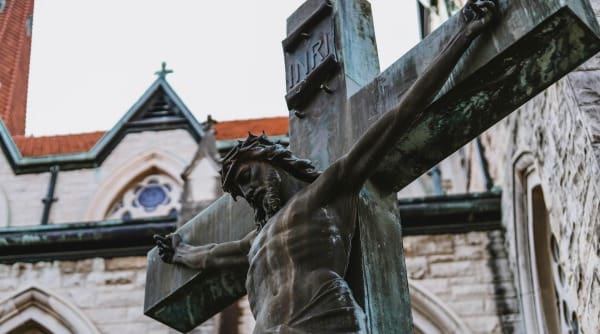Because our culture is all about rejecting the cross, and because the cross is our ladder to Heaven, I want to talk about our perception of it.
It’s spiritually helpful to know that our disposition toward the cross (suffering) will depend on where we are in the interior life. Traditional Catholic spirituality talks of three stages (or ages) of holiness for the Christian, and our response to the cross changes as we journey through those stages and approach closer to the Heart of the Trinity.
First, here’s the briefest of explanations about the stages of holiness, and then we will get to how they relate to our understanding and acceptance of the cross:
The first stage is called the purgative stage (the way of the beginner or “spiritual courtship”).
The second stage is called the illuminative stage (the way of the proficient or “spiritual betrothal”).
The third stage is called the unitive stage (the way of the perfect or “spiritual marriage”).
These stages are neither static nor perfectly delineated (we may enter a new stage or fall back to an old one at any given time), yet they are identifiable and trustworthy as our guide to the interior life, and our trajectory should be forward-moving.
In the first stage (purgation), the soul has left mortal sin behind and is now in a state of grace, on the path to holiness (remember that a soul in mortal sin is without sanctifying grace and therefore is not on the path at all). At the beginning of the first stage, the soul still experiences great temptation to slip back into mortal sin, as concern for self continues to crowd out God. The soul still desires to hang onto “control” and is troubled by fears and anxiety. I believe it was the late Fr. Benedict Groeschel who said that most Christians (again, assuming a state of grace) live and die in the purgative stage.
In the second stage (illumination), the soul has for the most part overcome all habitual sin, mortal and venial, and when venial sin occurs it is never deliberate. The soul is aware of and on guard against even its imperfections. The need for control is replaced by a firm trust in God—fear and anxiety start to recede, with peace and joy taking their place. Prayer life changes from active to more passive (in the purgative stage, we do most of the active work of prayer; in the illuminative stage, God becomes more active, and we humbly receive). Many Christians glimpse or enter the illuminative stage, but then fall back to the first stage.
In the third stage (union), the soul has what the saints achieved on earth—union with the Holy Trinity. The soul has forgotten self, given up its will, and abandoned itself to God. Prayer progresses to infused contemplation. By the end of the unitive stage, the only thing left for the soul’s transformation is the Beatific Vision itself, encountered in Heaven. Most of us won’t progress to union while living on this earth (because we won’t give up our wills), but we are all called to this level of holiness.
Which brings us to the cross—that thing that we wish to avoid, which is seemingly blocking our path. But it’s only blocking our path, or the cause of our stumbling, because we refuse to pick it up and carry it. We’ve heard a thousand times Christ’s command to “take up your cross and follow me.” But will it always seem so difficult to bear? Will we always desire to rebel against it?
Not necessarily.
I was fascinated when I first learned that souls will react differently to the cross and to suffering depending on which stage of holiness they are in. I highly recommend a little book called The Comforter: The Spirit of Joy, by Fr. Andrew Apostoli, from which I synthesize the following:
Souls in the first stage will respond to suffering with patience. We don’t have perfect patience, and we often call on God to get us out of this suffering, but by steady prayer and practice, we can become more patient with suffering. The important thing is to have the desire to change, and to be open to correction. But at this stage, Christ’s teachings about the cross can seem to us unreasonable and quite difficult, if not impossible, to live out. We still don’t fully accept our cross, and we really want out of suffering.
Souls in the second stage, who are more advanced in the spiritual life than the beginner, approach suffering with resignation. This is a higher, more developed stage of patience. It’s more mature. There is still a wish that suffering would go away, but there is more of a willingness to undergo it and to accept it when it’s here, instead of complaining against it. Resignation is a letting-go of our preferences, a vanquishing of self-love. We start to become aware that there can be a profound spiritual good in undergoing and accepting suffering. Later in the second stage comes abandonment to suffering. Virtue has become much more habitual and advanced, and the soul places itself in God’s hands, with a deep and abiding trust.
Souls in the third stage experience joy in suffering. Do not be confused! This has nothing to do with feelings of self-hate or self-pity (“I deserve to suffer”), nor is a masochistic desire to feel pain. It is a joy in suffering rooted purely out of love for God. Heavy and sorrowful human emotions are still experienced—these do not go disappear, nor should they!—and the suffering is real and difficult, but the soul is acutely aware that this suffering is never borne alone, and that it has real supernatural meaning. Finally, in the last part of the third stage, the Christian’s disposition to suffering and the cross is perfect joy. Yes, you read that right. The power and the beauty of the cross is understood in its fullness. Along with this understanding comes a real and deep desire for the cross, and the general desire to suffer for Jesus—to imitate Him, to share in His sufferings, to share in His mission of salvation. This includes the desire for humiliation, and the desire for martyrdom. The motives at this stage are pure and completely selfless.
Please don’t be overwhelmed at the thought of where you are and where you “should” be, because holiness is a life’s work! A person must grow in grace to understand that kind of joy in suffering, and—barring a massive infusion of grace where God wills to advance us very quickly—our transformation and understanding will happen slowly, gradually, with each incremental giving up of our own will as we love God more.
It’s a lot to take in when we first learn about it all, but it is good to know the path that we are all called to travel (and that all the saints knew!). So many of us fearful beginners wonder if we will have the grace to suffer well when the time of crucible comes, and I personally have felt very consoled to know that the grace and peace and lack of fear will come as we progress in our interior life. This progression is accomplished through prayer and by freely giving up the only thing that is truly ours to give to God: our will.
Despite the message of the culture and even some in the Church, there is no other means to sanctity but through the cross. And the Lord who carried His own Cross before us (and for us!) will be with us, pouring out the grace we need, every step of the way.
This post originally appeared on leilamiller.net.
Photo courtesy of Unsplash.




